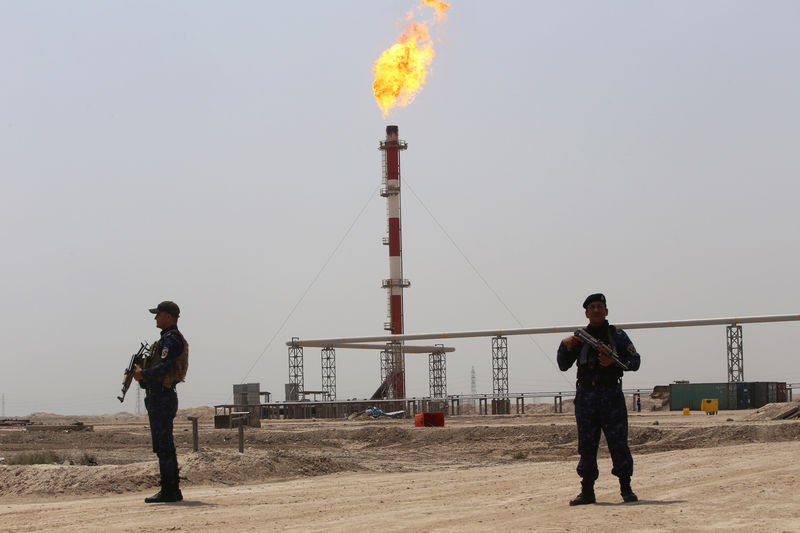By Alex Lawler
LONDON (Reuters) - Oil output in Iran and Venezuela, under U.S. sanctions, has fallen by more than that of other OPEC members party to a supply cut pact, suggesting President Trump's policies have had a greater impact on oil production than OPEC itself.
The sanctions have deepened the impact of supply cuts agreed by the Organization of the Petroleum Exporting Countries, which is expected at meetings with its allies next Monday and Tuesday in Vienna to renew the accord.
OPEC, Russia and other non-members, an alliance known as OPEC+, agreed in December to reduce supply by 1.2 million barrels per day from Jan. 1. OPEC's share of the cut is 800,000 bpd, to be delivered by 11 members - all except Iran, Libya and Venezuela.
The actual cut is more than 2.5 million bpd, according to OPEC figures, because top exporter Saudi Arabia has voluntary reduced supply by more than the deal requires and because of U.S. sanctions on two OPEC founder members Venezuela and Iran.
(Graphic: OPEC's oil supply cut since October 2018 - https://tmsnrt.rs/2ZMzkWO)
Trump has been asking OPEC to pump more to drive down prices, which hit a 2019 high above $75 a barrel in April but have since fallen back to about $66. Some in the group have argued he is to blame for higher fuel costs.
"You cannot place sanctions on two OPEC founder members and still blame OPEC," a senior Iranian OPEC official, Hossein Kazempour Ardebili, said last year.
Measured against October 2018 production used as a baseline by most OPEC members in the supply accord, supply from the three exempt nations had declined by 1.37 million bpd by May.
(Graphic: Oil output in OPEC's exempt nations - https://tmsnrt.rs/2Fx7Lcc)
That exceeds the 1.16 million bpd drop posted by the 11 countries involved in the supply cut deal in the same time.
Output in Venezuela, once a top three OPEC producer, has been falling for years due to economic collapse. This year, the drop has steepened due to U.S. sanctions on state oil company PDVSA designed to oust President Nicolas Maduro.
The United States reimposed sanctions on Iran in November 2018 after pulling out of a nuclear accord between Tehran and six world powers. Aiming to cut Iran's sales to zero, Washington in May ended sanctions waivers to importers of Iranian oil.
Iran's crude exports have dropped to about 300,000 bpd in the first three weeks of June, according to industry sources who track the flows and data from Refinitiv Eikon, from above 2.5 million bpd in April 2018 before Trump quit the nuclear deal.
OPEC and its allies meet on Monday and Tuesday in Vienna to decide whether to extend the supply cuts.
Scenarios for the OPEC meeting include:
* Rollover: the base case. OPEC agrees to keep the same level of supply cuts in the second half of 2019. Saudi Arabia said on June 7 OPEC was close to agreeing this.
"An extension of the production cut agreement by another six months appears a done deal," said Carsten Fritsch, analyst at Commerzbank (DE:CBKG).
* Increase: Less likely than a rollover. OPEC decides to partially or fully unwind the supply cut.
* Deeper cut: Unlikely but cannot be ruled out. Algeria has floated the idea.
* No deal: Also unlikely but cannot be ruled out. OPEC in December 2015 failed to agree a production target after Iran said it would not consider production curbs until it restored output scaled back under earlier sanctions.
